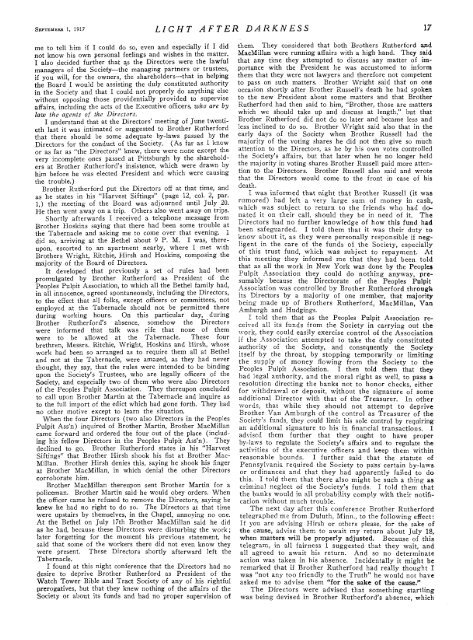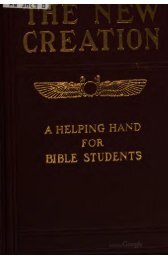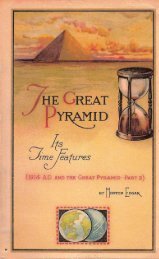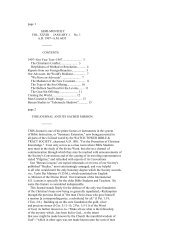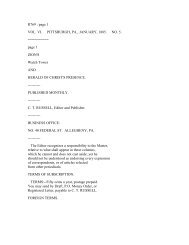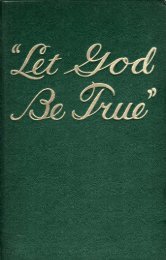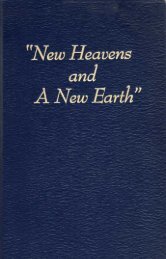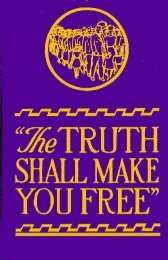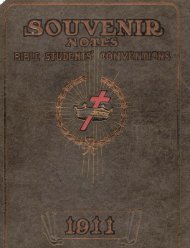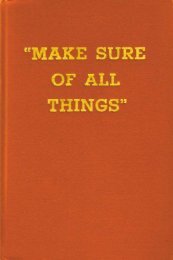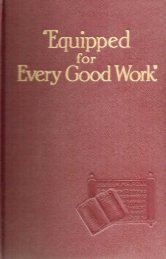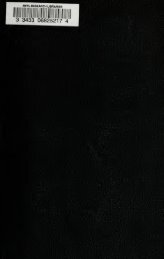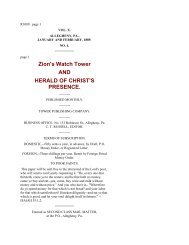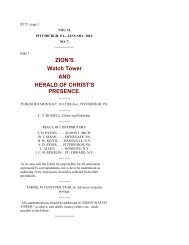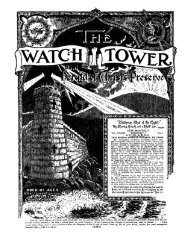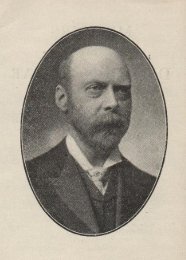1917 Watchtower Bible Student Schism - A2Z.org
1917 Watchtower Bible Student Schism - A2Z.org
1917 Watchtower Bible Student Schism - A2Z.org
You also want an ePaper? Increase the reach of your titles
YUMPU automatically turns print PDFs into web optimized ePapers that Google loves.
SE~TEMBER I, <strong>1917</strong> LICHT AFTER DARKNESS 17<br />
me to tell him if I could do so, even and especially if I did<br />
not know his own personal feelings and wishes in the matter.<br />
I also decided further that as the Directors were the lawful<br />
managers of the Sociee-the managing partners or trustees,<br />
if you will, for the owners, the shareholders-that in helping<br />
the Board I would be assisting the duly constituted authority<br />
in the Society and that I could not properly do anything else<br />
without opposing those providentially provided to supervise<br />
affairs, including the acts of the Executive officers, who are by<br />
law the agefits of the Directors.<br />
I understand that at the Directors' meeting of June twentieth<br />
last it was intimated or suggested to Brother Rutherford<br />
that there should be some adequate by-laws passed by the<br />
Directors for the conduct of the Society. (As far as I know<br />
or as far as "the Directors" knew, there were none except the<br />
very incomplete ones passed at Pittsburgh by the shareholders<br />
at Brother Rutherford's insistence, which were drawn by<br />
him before he was elected President and which were causing<br />
the trouble.)<br />
Brother Rutherford put the Directors off at that time, and<br />
as he states in his "Harvest Siftings" (page 12, col. 2, par.<br />
1,) the meeting of the Board was adjourned until July 20.<br />
He then went away on a trip. Others also went away on trips.<br />
Shortly afterwards I received a telephone message from<br />
Brother Hoskins saying that there had been some trouble at<br />
the Tabernacle and asking me to come over that evening. I<br />
did so, arriving at the Bethel about 9 P. M. I was, thereupon,<br />
escorted to an apartment nearby, where I met with<br />
Brothers Wright, Ritchie, Hirsh and Hoskins, composing the<br />
majority of the Board of Directors.<br />
It developed that previously a set of rules had been<br />
promulgated by Brother Rutherford as President of the<br />
Peoples Pulpit Association, to which all the Bethel family had,<br />
in all innocence, agreed spontaneously, including the Directors,<br />
to the effect that all folks, except officers or committees, not<br />
employed at the Tabernacle should not be permitted there<br />
during working hours. On this particular day, during<br />
Brother Rutherford's absence, somehow the Directors<br />
were informed that talk was rife that none of them<br />
were to be allowed at the Tabernacle. These four<br />
brethren, Messrs. Ritchie, Wright, Hoskins and Hirsh, whose<br />
work had been so arranged as to require them all at Bethel<br />
and not at the Tabernacle, were amazed, as they had never<br />
thought, they say, that the rules were intended to be binding<br />
upon the Society's Trustees, who are legally officers of the<br />
Society, and especially two of them who were also Directors<br />
of the Peoples Pulpit Association. They thereupon concluded<br />
to call upon Brother Martin at the Tabernacle and inquire as<br />
to the full import of the edict which had gone forth. They had<br />
no other motive except to learn the situation.<br />
When the four Directors (two also Directors in the Peoples<br />
Pulpit Ass'n) inquired of Brother Martin, Brother MacMillan<br />
came forward and ordered the four out of the place (including<br />
his fellow Directors in the Peoples Pulpit Ass'n). They<br />
declined to go. Brother Rutherford states in his "Harvest<br />
Siftings" that Brother Hirsh shook his fist at Brother Mac-<br />
Millan. Brother Hirsh denies this, saying he shook his finger<br />
at Brother MacMillan, in which denial the other Directors<br />
corroborate him.<br />
Brother MacMillan thereupon sent Brother Martin for a<br />
policeman. Brother Martin said he would obey orders. When<br />
the officer came he refused to remove the Directors, saying he<br />
knew he had no right to do so. The Directors at that time<br />
were upstairs by themselves, in the Chapel, annoying no one.<br />
At the Bethel on July 17th Brother MacMillan said he did<br />
as he had, because these Directors were disturbing the work;<br />
later f<strong>org</strong>etting for the moment his previous statement, he<br />
said that some of the workers there did not even know they<br />
were present. These Directors shortly afterward left the<br />
Tabernacle.<br />
I found at this night conference that the Directors had no<br />
desire to deprive Brother Rutherford as President of the<br />
Watch Tower <strong>Bible</strong> and Tract Society of any of his rightful<br />
prerogatives, but that they knew nothing of the affairs of the<br />
Society or about its funds and had no proper supervision of<br />
them. They considered that both Brothers Rutherford and<br />
MacMillan were running affairs with a high hand. They said<br />
that any time they attempted to discuss any matter of importance<br />
with the President he was accustomed to inform<br />
them that they were not lawyers and therefore not competent<br />
to pass on such matters. Brother Wright said that on one<br />
occasion shortly after Brother Russell's death he had spoken<br />
to the new President about some matters and that Brother<br />
Rutherford had then said to him, "Brother, those are matters<br />
which we should take up and discuss at length," but that<br />
Brother Rutherford did not do so later and became less and<br />
!ess inclined to do so. Brother Wright said also that in the<br />
early days of the Society when Brother Russell had the<br />
majority of the voting shares he did not then give so much<br />
attention to the Directors, as he by his own votes controlled<br />
the Society's affairs, but that later when he no longer held<br />
the majority in voting shares Brother Russell paid more atten-<br />
tion to the Directors. Brother Russell also said and wrote<br />
that the Directors would come to the front in case of his<br />
death.<br />
I was informed that night that Brother Russell (it was<br />
rumored) had left a very large sum of money in cash,<br />
nhich was subject to return to the friends who had donated<br />
it on their call, should they be in need of it. The<br />
Directors had no further knowledge of how this fund had<br />
been safeguarded. I told them that it was their duty to<br />
know about it, as they were personally responsible if negligent<br />
in the care of the funds of the Society, especially<br />
of this trust fund, which was subject to repayment. At<br />
this meeting they informed me that they had been told<br />
that as all the work in New York was done by the Peoples<br />
Pulpit Association they could do nothing anyway, pre-<br />
sumably because the Directorate of the Peoples Pulpit<br />
Association was controlled by Brother Rutherford through<br />
its Directors by a majority of one member, that majority<br />
being made up of Brothers Rutherford, MacMillan, Van<br />
Amburgh and Hudgings.<br />
I told them that as the Peoples Pulpit Association received<br />
all its funds from the Society in carrying out the<br />
work, they could easily exercise control of the Association<br />
if the Association attempted to take the duly constitute&<br />
authority of the Society, and consequently the Society<br />
itself by the throat, by stopping temporarily or limiting<br />
the supply of money flowing from the Society to the<br />
Peoples Pulpit Association. I then told them that they<br />
had legal authority, and the moral right as well, to pass a<br />
resolution directing the banks not to honor checks, either<br />
for ~vithdrawal or deposit, without the signature of some<br />
additional Director with that of the Treasurer. In other<br />
words, that while they should not attempt to deprive<br />
Brother Van Amburgh of the control as Treasurer of the<br />
Society's funds, they could limit his sole control by requiring<br />
an additional signature to his in financial transactions. I<br />
advised them further that they ought to have proper<br />
by-laws to regulate the Society's affairs and to regulate the<br />
activities of the executive officers and keep them within<br />
reasonable bounds. I further said that the statute of<br />
Pennsylvania required the Society to pass certain by-laws<br />
or ordinances and that they had apparently iailed to do<br />
this. I told them that there also might be such a thing as<br />
criminal neglect of the Society's funds. I told them that<br />
the bsnks would in all probability comply with their notification<br />
without much trouble.<br />
The next day after this conference Brother Rutherforcf<br />
telegraphed me from Dulurh, Minn., to the following effect:<br />
If you are advising Hirsh or others please, for the sake of<br />
the cause, advise them to await my return about July 18,<br />
when matters will be properly adjusted. Because of this<br />
telegram, in all fairness I suggested that they wait, and<br />
all agreed to await his return. And so no determinate<br />
action was taken in his absence. Incidentally it might be<br />
remarked that if Brother Rutherford had really thought I<br />
was "not any too friendly to the Truth" he would not have<br />
asked me to advise them "for the sake of the cause."<br />
The Directors were advised that something startling<br />
was being devised in Brother Rutherford's absence, which


